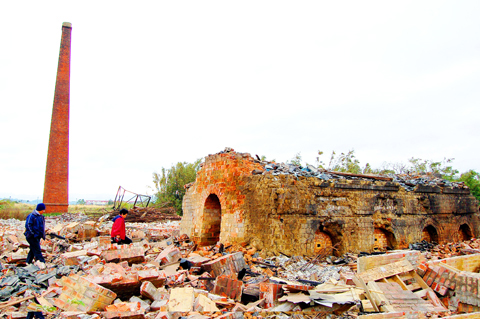After the Miaoli County Government razed three kilns that served as the last witness to the county’s once-prosperous pottery industry, preservationists set up a commemorative Web site and pledged to take action against county government officials who backed down from an agreement with the Council for Cultural Affairs (CCA) to postpone the demolition.
“This is not the time for us to mourn: We must keep fighting,” Yang Chang-chen (楊長鎮), a Miaoli native and long-time activist for local culture preservation, wrote in a message posted on the site.
Yang said he would write a petition to the Control Yuan, requesting a probe into Miaoli County Commissioner Liu Cheng-hung (劉政鴻) and potential impeachment.

PHOTO: PENG CHIEN-LI, TAIPEI TIMES
The three kilns were located in Miaoli’s Houlong Township (後龍) and were surrounded by rice fields and farms.
The area had a flourishing industry producing pottery, china, tiles and bricks during the Japanese colonial period.
As the nation’s economy developed, the old-fashioned labor-intensive kilns that once dotted the area became outdated. Eventually they were either closed, demolished or turned into factories that produce pottery with modern technology and equipment.
In 2003, however, the county government said it would build a station for the high-speed rail nearby and drew up an urban development project to turn the surrounding area into a transportation hub and high-tech industrial zone.
After the plans were drawn up, a county cultural heritage assessment commission said the three remaining old-style kilns were not of “enough historic value for preservation” and could be torn down.
Local historians and activists were upset by the decision and formed the Alliance to Rescue the Historic Kilns of Miaoli.
More than 50 civic groups across the country and nearly 600 individuals signed a petition asking the authorities to preserve the kilns.
“Miaoli can only become an attractive place for visitors if we preserve all these places with history and memory,” Den Shui-hui (鄧淑慧), founder of the alliance and owner of a traditional snake-shaped kiln in nearby Jhunan Township (竹南) told the Taipei Times via telephone.
“These kilns were hand-built and each of the bricks used was hand-made,” Den said.
“Many of the bricks actually bear some kind of mark on them and each mark has a story behind it,” Den said.
Den is also a researcher who has authored eight books on kilns in Miaoli.
The activists took their case to the CCA.
Last Tuesday, the council said it would ask the Miaoli County Government to halt the demolition and wait for the results of further negotiations with the activists.
Despite all the efforts, two of the three kilns were torn down on Thursday.
On the same day, the council released a statement expressing regret over the demolition and said it had reached an agreement with the county government to “postpone demolition until after a negotiation meeting on Jan. 14 to spare the remaining bun-shaped kiln.”
The last kiln, however, was torn down on Friday.
“We demand apologies from the CCA and County Commissioner Liu and we demand that the head of the county’s International Culture and Tourism Bureau, Lin Chen-feng [林振豐], step down. We’ll also sue him,” Den said.

Alain Robert, known as the "French Spider-Man," praised Alex Honnold as exceptionally well-prepared after the US climber completed a free solo ascent of Taipei 101 yesterday. Robert said Honnold's ascent of the 508m-tall skyscraper in just more than one-and-a-half hours without using safety ropes or equipment was a remarkable achievement. "This is my life," he said in an interview conducted in French, adding that he liked the feeling of being "on the edge of danger." The 63-year-old Frenchman climbed Taipei 101 using ropes in December 2004, taking about four hours to reach the top. On a one-to-10 scale of difficulty, Robert said Taipei 101

Nipah virus infection is to be officially listed as a category 5 notifiable infectious disease in Taiwan in March, while clinical treatment guidelines are being formulated, the Centers for Disease Control (CDC) said yesterday. With Nipah infections being reported in other countries and considering its relatively high fatality rate, the centers on Jan. 16 announced that it would be listed as a notifiable infectious disease to bolster the nation’s systematic early warning system and increase public awareness, the CDC said. Bangladesh reported four fatal cases last year in separate districts, with three linked to raw date palm sap consumption, CDC Epidemic Intelligence

Taiwanese and US defense groups are collaborating to introduce deployable, semi-autonomous manufacturing systems for drones and components in a boost to the nation’s supply chain resilience. Taiwan’s G-Tech Optroelectronics Corp subsidiary GTOC and the US’ Aerkomm Inc on Friday announced an agreement with fellow US-based Firestorm Lab to adopt the latter’s xCell, a technology featuring 3D printers fitted in 6.1m container units. The systems enable aerial platforms and parts to be produced in high volumes from dispersed nodes capable of rapid redeployment, to minimize the risk of enemy strikes and to meet field requirements, they said. Firestorm chief technology officer Ian Muceus said

MORE FALL: An investigation into one of Xi’s key cronies, part of a broader ‘anti-corruption’ drive, indicates that he might have a deep distrust in the military, an expert said China’s latest military purge underscores systemic risks in its shift from collective leadership to sole rule under Chinese President Xi Jinping (習近平), and could disrupt its chain of command and military capabilities, a national security official said yesterday. If decisionmaking within the Chinese Communist Party has become “irrational” under one-man rule, the Taiwan Strait and the regional situation must be approached with extreme caution, given unforeseen risks, they added. The anonymous official made the remarks as China’s Central Military Commission Vice Chairman Zhang Youxia (張又俠) and Joint Staff Department Chief of Staff Liu Zhenli (劉振立) were reportedly being investigated for suspected “serious